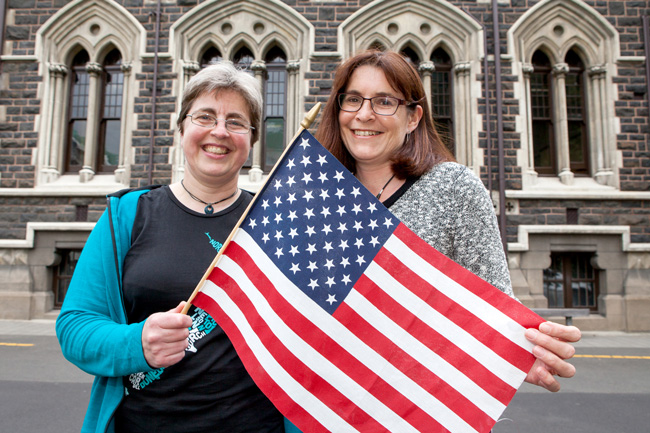
Otago's Associate Professor Ruth Empson of Physiology (left) and Professor Rachel Spronken-Smith of the Graduate Research School will travel to the United States on Fulbright Scholarships. Photo: Sharron Bennett.
How does Otago's PhD programme stack up against similar programmes in the United States, and how employable are our graduates compared to their United States counterparts?
These questions are being investigated by the Dean of Otago's Graduate Research School Professor Rachel Spronken-Smith, who will travel to the United States early next year on a Fulbright Scholarship.
Professor Spronken-Smith's research, comprising case studies at Otago and the University of California, Berkeley, involves comparing doctoral training systems in the United States and New Zealand and determining how well the different systems are preparing graduates for employment.
"I am also thankful to the University of Otago for supporting my application and allowing the leave to undertake this research."
The research will include surveying and interviewing recent PhD graduates to determine how PhD candidates are developing research and transferable skills during their study, and how these skills are being applied in their workplace, Professor Spronken-Smith says. Employers of PhD graduates will be also be surveyed to learn their views on the skill sets that PhD graduates bring to the job.
Professor Spronken-Smith along with Physiology's Associate Professor Empson, were recipients in the latest round of Fulbright Scholarships announced late last year.
Professor Spronken-Smith says she feels “immensely privileged” to receive this award and is incredibly grateful to Fulbright New Zealand.
“I am also thankful to the University of Otago for supporting my application and allowing the leave to undertake this research.
“I am very excited at the prospect of forging new research collaborations. I have only recently moved into the doctoral education research field, so this research will be instrumental in developing my international profile.”
Associate Professor Empson will use her scholarship to investigate how the brain controls movement. She will travel to the United States in July to work with Professor Jennifer Raymond, a world leader in cerebellar learning at Stanford University.
For Professor Empson the scholarship is a wonderful opportunity to work with international colleagues on a mutual project and also to learn more about American culture.
"In the future our results could also have far reaching implications for improving movement control and rehabilitation strategies in a variety of neurological disorders."
“We know that “practice makes perfect”, but only if you practise perfectly! How do we correct our movement errors and learn “perfection”? The cerebellum is the part of the brain where this type of movement learning and error correction takes place but exactly how brain cells in the cerebellum do this remains a mystery,” Associate Professor Empson explains. “I will work with Professor Raymond at Stanford to visualise cerebellar brain cell activity during movement learning.”
Professor Empson says the collaboration, which also involves colleagues at Imperial College London, has the potential to change the way scientists think about how the brain controls movement.
“In the future our results could also have far reaching implications for improving movement control and rehabilitation strategies in a variety of neurological disorders.”
In addition to this work, Associate Professor Empson, who is a member of the Dunedin Rotary Club, hopes to join forces with Rotarians in Palo Alto, where Stanford is located.
“Even though I will be busy with my research, the opportunity to “make time” to make even a small difference for our fellow humans is immensely rewarding.”